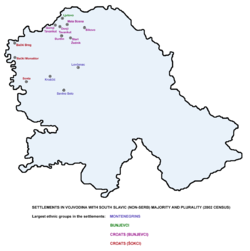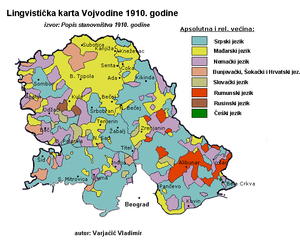- Croats of Vojvodina
-
Part of a series of articles on Croats  RecognizedCroatia
RecognizedCroatia
Bosnia and Herzegovina
Serbia (Vojvodina)
Kosovo
Austria
Italy
Montenegro
Romania
Slovakia
HungarySubgroupsCroats are the fourth largest ethnic group in the Vojvodina province of Serbia. According to the 2002 census, there are 56,546 ethnic Croats in Vojvodina, constituting 2.78% in the population of the province.
Contents
Population
About two thirds of all Croats in Vojvodina have Bunjevci or Šokci origins.[1] Those of Bunjevci origin constituting the largest part of population in several villages in the Subotica municipality: Bikovo, Gornji Tavankut, Donji Tavankut, Đurđin, Mala Bosna, and Stari Žednik.
Croats of Šokci origin constituting the largest part of population in three villages: Sonta (in the municipality of Apatin), Bački Breg and Bački Monoštor (both in the municipality of Sombor).[2]
About one third of the Croats in Vojvodina are neither of Šokac nor Bunjevac origin[citation needed].History
During 17th century, Roman Catholic Bunjevci from Dalmatia and western Herzegovina migrated to Vojvodina, where Šokci had been living since the 8th century, and between 1689, when the Habsburg empire conquered parts of Vojvodina, and the end of the 19th century, a small number of Croats from Croatia[citation needed] migrated to the region.
Before the 20th century, most of the Bunjevac and Šokac populations living in Hungary (Vojvodina was at that time "southern Hungary") haven't been nationally awakened yet. Their leaders (like Ivan Antunović, Blaško Rajić, Pajo Kujundžić, Mijo Mandić, Lajčo Budanović, Stipan Vojnić Tunić, Vranje Sudarević, Petar Pekić) worked hardly to awake their Croatian national feelings.
According to 1851 data, the population of the Voivodship of Serbia and Tamiš Banat, the historical province that was predecessor of present-day Vojvodina, included, among other ethnic groups, 62,936 Bunjevci and Šokci and 2,860 Croats.[3] But, Hungarian statistics in 19th century tried to minimize the number of Croats in Hungary by presenting them as different categories or even categorizing them as "others" (in 1910 Hungarian census, 70,000 Bunjevacs were categorized as "others").[4]
The 1910 Hungarian census also showed large differences in the numbers of those who considered themselves Bunjevci and Šokci, and those who considered themselves Croats. According to the census, in the city of Subotica there were only 39 citizens who declared Croatian as their native language, while 33,390 citizens were listed as speakers of "other languages" (most of them declared Bunjevac as their native language).[5] In the city of Sombor, 83 citizens declared Croatian language, while 6,289 citizens were listed as speakers of "other languages". [3] In the municipality of Apatin, 44 citizens declared Croatian and 7,191 declared "other languages" (mostly Bunjevac, Šokac and Gypsy).[6]
In the 20th century, most of the Šokci and part of the Bunjevci began to consider themselves Croats.
During the war in Croatia Serbian extremists organized and participated in the expulsion of the Croats of Vojvodina. The President of the Serbian Radical Party, Vojislav Šešelj is indicted for those crimes [7] The number of Croats which have left Vojvodina under political pressure is between 20,000 and 40,000.[8]
Politics
The Croats of Vojvodina are politically represented by the Democratic League of Croats in Vojvodina. The Croatian President Stjepan Mesić has urged the Serbian Government to make Croats a recognized minority with a seat in Parliament, as part of the new Constitution of Serbia.
Other parties of Croats in Vojvodina are Demokratska zajednica Hrvata (Democratic Union of Croats), Hrvatska bunjevačko-šokačka stranka (Croatian Bunjevac-Šokac Party), Hrvatski narodni savez (Croatian national alliance) and Hrvatska srijemska inicijativa (Croatian Syrmian Initiative).
Hrvatsko nacionalno vijeće Republike Srbije (National Council of Croats of Republic of Serbia) is, according to its Statute, a body of self-government of Croat minority in Serbia.
Language
The Croatian language is one of the official languages of Vojvodina.
See also
References
- ^ Lazo M. Kostić, Srpska Vojvodina i njene manjine, Novi Sad, 1999.
- ^ Popis stanovništva, domaćinstva i stanova u 2002, Stanovništvo - nacionalna ili etnička pripadnost, podaci po naseljima, knjiga 1, Republički zavod za statistiku, Beograd, Februar 2003.
- ^ Dr Dušan J. Popović, Srbi u Vojvodini, knjiga 3, Novi Sad, 1990.
- ^ Juraj Lončarević: Hrvati u Mađarskoj i Trianonski ugovor, Školske novine, Zagreb, 1993, ISBN 953-160-004-X
- ^ [1]
- ^ [2]
- ^ Vojislav Seselj indictment
- ^ Hrvatska nacionalna manjina u Srbiji
Ethnic groups in Serbia Central Serbia Serbs · Albanians · Bosniaks · Ethnic Muslims · Bulgarians · Croats · Macedonians · Montenegrins · Roma · Romanians (Vlachs) · YugoslavsVojvodina Banat Bulgarians · Bunjevci · Croats (Šokci) · Germans (Danube Swabians and Banat Swabians) · Hungarians (Szekelys) · Montenegrins · Macedonians · Pannonian Rusyns · Roma · Serbs · Slovaks · Yugoslavs · Romanians · Czechs · Slovenes · Gorani people · Ukrainians · Albanians · RussiansKosovo[a] ^a Kosovo is the subject of a territorial dispute between the Republic of Serbia and the self-proclaimed Republic of Kosovo. The latter declared independence on 17 February 2008, while Serbia claims it as part of its own sovereign territory. Its independence is recognised by 85 UN member states.Categories:
Wikimedia Foundation. 2010.





